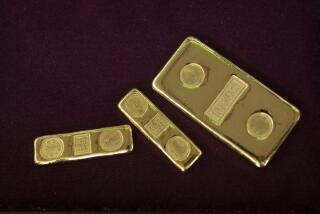Russia, Germany Pledge to Battle Nuclear Smuggling : Europe: Officials fail to determine origins of seized plutonium. They urge global information-sharing on issue.
- Share via
MOSCOW — In the wake of last week’s plutonium scare, Russia and Germany agreed Monday to boost their joint efforts to prevent nuclear smuggling, but they failed to determine whether the atomic contraband captured in Munich actually originated in Russia.
Wrapping up three days of talks in Moscow, Bernd Schmidbauer, the German intelligence coordinator, and his Russian counterparts issued a determinedly neutral statement concluding that they must all fight harder against the nuclear black market “regardless of its origins.”
German officials have said the 10.5-ounce cache of purloined plutonium-239, nabbed in Munich on a Lufthansa flight from Moscow two weeks ago, probably came from Russia. But Moscow has strenuously denied it could have been produced here, and Sergei Stepashin, Russia’s counterintelligence chief, told reporters Monday that its point of origin remains unclear.
The plutonium incident, the fourth lot of nuclear contraband to surface in Germany in four months, reignited global fears that chaos and corruption in the former Soviet Union could spawn a plentiful supply of illicit uranium and plutonium that could end up in the hands of terrorists or a hostile dictatorship.
According to reports from Bonn, the Russian-German agreement calls for greater intelligence swaps between the two countries on illegal nuclear materials and tougher control at the borders. It also proposes an international clearinghouse for information on nuclear smuggling.
“There is no bad without good,” Stepashin said. “This latest case has stimulated both agencies to move to concrete, operative work.”
Aware that confrontation would only make matters worse, both sides made a point of the cordial atmosphere of Schmidbauer’s talks. But the friendliness appeared strained.
Germany’s finance minister had said in remarks published over the weekend that continued economic aid--Germany is Russia’s largest donor--would depend on Russian efforts to stem nuclear smuggling.
Meanwhile, Russian nuclear officials concentrated on proving that the plutonium could not have originated in their plants or laboratories.
At the Kurchatov Atomic Energy Institute in Moscow, Russia’s premier nuclear science center, the director for external affairs said an extensive check of supplies is under way. But, so far, the nuclear materials there “have not decreased by even a gram.”
Russian television showed the extensive security precautions taken at the institute, including a special gate that checks for traces of nuclear materials.
But in the past, Russian officials have acknowledged that theft of atomic material is likely given the low salaries of most nuclear workers and the messy state of Russia’s new borders.
Plutonium is dangerous not only because it is a key ingredient of nuclear bombs but because it is so extremely toxic that even the tiniest grain can cause cancer. Security officials’ nightmares range from the prospect that states like Libya and Iraq could get an atomic bomb to the possibility that terrorists could poison a whole city’s water supply with a few pounds of plutonium.
Schmidbauer did not provide his Russian hosts with samples of the plutonium seized in Munich; he gave them only European scientists’ reports on its profile.
But Russian experts continued to insist it did not appear to have been made here and that its quality indicates it came from a Western reactor. Some Russian officials believe the plutonium affair has been cooked up to justify the imposition of international control on Russia’s nuclear plants.
Stepashin and Schmidbauer tried to take the emphasis off finger-pointing and said they devoted far more discussion to planning joint action. They accused the media of trying to depict a confrontation where one never existed.
More to Read
Sign up for Essential California
The most important California stories and recommendations in your inbox every morning.
You may occasionally receive promotional content from the Los Angeles Times.













